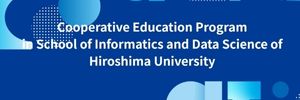Fujitsu Laboratories Ltd.
Akihiko Kasagi
2012 Graduate of School of Engineering,
Cluster 2 (Information Engineering)
Future career path
[License] High school teacher (class-I) (mathematics and information science)
※ A teacher training course is undergoing a process of obtaining an authorization from the Ministry of Education, Culture, Sports, Science and Technology (MEXT). The timing of opening the teacher training course is subject to change depending on the determination by MEXT.
Human resources capable of accurately grasping data and effectively using data, which is the educational achievement target of the Department of Information Engineering, are needed in all fields, without regards to sectors and professions. In particular, graduates of the Data Science Course are expected to contribute to society as information contents specialists, and graduates of the Informatics Course as information processing specialists.
Major professions of graduates
Contributors to diverse industrial sectors including manufacturing, finance, IT, medical care, pharmaceuticals, education and services:
Data scientist
An expert of data collection, compilation and analysis using information processing knowledge and statistical analysis skills.
Data analyst
An expert for identifying problems using statistical analysis skills and suggesting possible solutions for the problems using information processing skills.
Supporters of technical development of hardware (device) and software (programming/software) adapting to more complicated, larger volume information and data:
Information service engineer
A producer and specialist of diversified information services using contents and data.
System engineer
An engineer who creates customized system using IT technologies and software engineering.
Researchers working at private companies and public research institutes:
Research associate
A researcher engaged in basic research for developing future scientific technology at universities' and companies' research institutes based on advanced knowledge and skills.
Employment after graduation
| Information/communication/services | NTT West, NTT Communications, NTT DATA i, TIS, IIJ, Accenture, Energia Communications, Yahoo! |
|---|---|
| Machinery/electrical appliances | OMRON, CASIO, Canon, Konica Minolta, Komatsu, Sharp, Panasonic, Sony, Ricoh, Hitachi, FUJITSU, Oki Electric Industry, Mitsubishi Electric |
| Automobiles | Mazda, TOYOTA, SUZUKI, DAIHATSU, Honda, Mitsubishi Motors |
| Electricity/gas | Chugoku Electric Power, Shikoku Electric Power |
| Finance | Hiroshima Bank, Momiji Bank |
| Others | High school teacher, public servant |
The above shows the recent results of employment of graduates of undergraduate and graduate schools related to the Department of Information Engineering, such as the School of Engineering, Cluster 2 (Information Engineering), the Division of Mathematical and Information Sciences of the School of Integrated Arts and Sciences, and the Graduate School of Engineering, Information Engineering Course.
For prospective students of the School of Informatics and Data Science ─Messages from graduates─

I am engaged in a job to contribute to a more convenient and comfortable society by data processing and analysis technologies.
Data processing and analysis technologies have become commonplace in our daily lives. See, when you are looking at an e-shopping site, a "recommended product" appears. Your computer estimates products which you may be interested in, based on browsing history data of many people. This browsing history data is generated at the very moment you click on the website, automatically making up a huge data cluster (i.e. big data). Analyzing such a huge amount of data by human is very difficult; however, engineers like us are contributing to more convenient and comfortable society through computer-based data processing and analysis.

RICOH Company, Ltd.
Komei Takashita
2014 Graduate of School of Engineering,
Cluster 2 (Information Engineering)
Learning and experience gained at Hiroshima University helped me to have a broader future vision.
My research subject at the University relates to high-speed processing of data such as images. I did some presentations at the academic society where I began to be rewarded for my contribution to the society. This experience led me to want to work at this sector to create useful things that can help many people, leveraging my information processing expertise developed at the University. I am currently involved in the development of a high-speed, high-quality printer for industrial use. The wide range of specialized knowledge I learned at Hiroshima University is helping me to do the work at the R&D site which requires a variety of technologies including image processing, mechanical control and communication control. Hiroshima University gave me inspiring learning opportunities and experience which helped me to find and achieve a future vision.


 Home
Home
